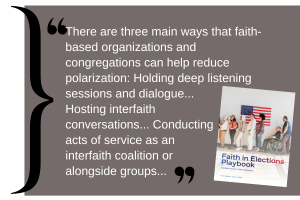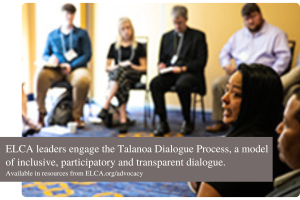Many ELCA synods, congregations and ELCA-affiliated state public policy offices are involved in advancing the important aim of addressing polarization in our communities. These ideas from the “Faith in Elections Playbook” of Interfaith America are reprinted by permission to resource additional ways we can individually and collectively reduce polarization and care for our communities.
Addressing polarization
Our country is deeply divided. Healing will require coming together across differences and working to protect the rights of all Americans – even those with whom we disagree. Understanding our polarized environment and committing to overcome this challenge is key to supporting a free, fair, and peaceful 2024 election.
THE NEED
- There are few issues that showcase our country’s polarization as clearly as our elections. Lack of trust in the outcome of the 2020 presidential election led some to violence, and has pushed countless others into an “us versus them” mentality. Without action, the 2024 election could further tear our communities apart, representing an existential crisis for American democracy. As trust erodes and divisions deepen, it is harder to protect the values that hold our country together, such as religious pluralism.
- Religious freedom scholar Asma Uddin writes, “Our partisan affiliations have morphed into identities, and what’s more, the identities include a host of things that have nothing to do with social policy.” As a result, individual faith communities are increasingly divided, and different religions are pushed into political camps against one another rather than seeking shared values on issues such as religious liberty or help for people in need.

THE RESPONSE
- Religious institutions can be a bulwark against polarization. People with diverse political beliefs, cultures, and socioeconomic backgrounds worship together in churches, synagogues, mosques, gurdwaras, and temples every day. Our collective faith communities must be able to live and serve together despite our different beliefs.
- There are three main ways that faith-based organizations and congregations can help reduce polarization:
- Holding deep listening sessions and dialogue across differences within their own organizations and faith communities.
- Hosting interfaith conversations that bring people together across religious differences to identify shared values and a shared vision for improving their communities.
- Conducting acts of service (including the activities contained in the Playbook) as an interfaith coalition or alongside groups with differing political perspectives.
- In addition to using the Faith in Elections Playbook as a way to unite Americans, there are many organizations – both religious and secular – who have created resources on how you can work to reduce polarization.
- If you are interested in hosting deep listening conversations and dialogue across differences, the following links will be most helpful:
- Interfaith America’s Shared Values Dialogue Guide and “Skills for Bridging the Gap” Curriculum provide opportunities for dep listening.
- Living Room Conversations provides scripts and frameworks for dialogues across a variety of differences and on a multitude of topics, including elections.
- Constructive Dialogue Institute is a 501(c)(3) that provides lessons and online training on how to lead conversations where people with different perspectives try to understand each other – without giving up their own beliefs – in order to work together.

- Resetting the Table provides skilled facilitation, communication skill-building, and online training in opening up meaningful communication across differences on charged political issues.
- If you are interested in hosting conversations to help find common ground or common purpose, the following will be helpful:
- One America Movement‘s work to combat toxic polarization.
- Braver Angels has multiple options for engagement, including their Trustworthy Elections Campaign, which will organize conversations in which citizens who are concerned with fraud, voter suppression, or both meet on equal terms in mixed groups to clarify differences and seek common ground.
- Millions of Conversations brings together groups of Americans to unite around common values and to discuss shared visions for the future.
- For specific resources for Christian leaders, we recommend the following:
- One America Movement’s Matthew 5:9 Fellowship, The Eilu v’Eliu Fellowship, and Faith Over Division.
- The After Party: Toward Better Christian Politics. This curriculum “does the complex – but absolutely necessary – theological work of reframing Christian political identity from today’s divisive partisan options.”
- “Civilize It” is a campaign by the United States Conference of Catholic Bishops to promote civility in political engagement.
ABOUT INTERFAITH AMERICA: Led by Founder and President Eboo Patel, Interfaith America inspires, equips, and connects leaders and institutions to unlock the potential of America’s religious diversity. Utilizing a research-backed approach, Interfaith America works across higher education, racial equity, health, workplace, bridgebuilding, democracy, and technology.
